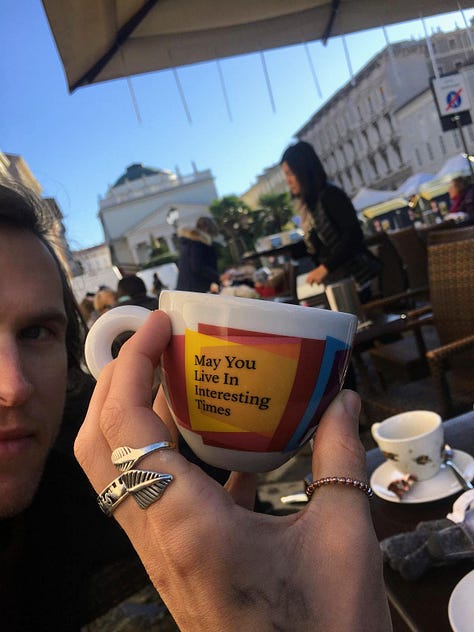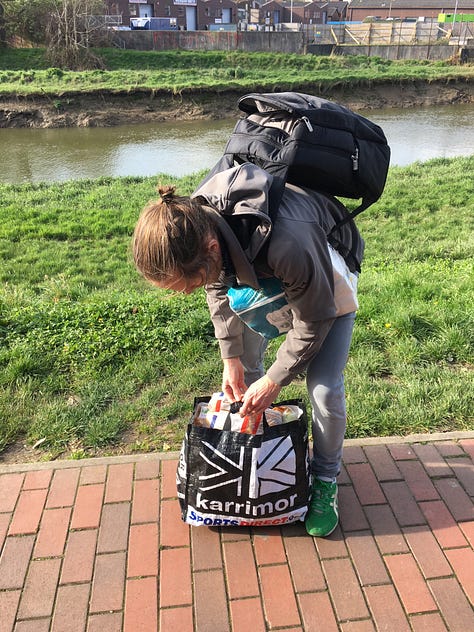On five years on
Trying to remember when the world ended, or didn't
Mid-afternoon, summer solstice 2019, and it was as if she had picked her moment. Daughter close by, beloved dog at her side, her fingers moved gently through fur, then moved no more. Not quite ninety but more than ready, Nan made it her shortest, that longest day. Two months later, our friend Liz died of cancer, thirty years younger and not nearly ready. No one picks their moment, not really.
Now it’s 2025, newspapers and magazines are full of ‘five years on’ pieces, harking back to the Covid-19 pandemic that took hold in 2020. A perfectly commissionable idea of this kind was pitched to me at the magazine where I work, but as on-trend as it was, I couldn’t imagine wanting to read it. Too soon for nostalgia, too long ago for clarity. More than that, when I try to think back five years, my mind goes to six.
The next thing I remember from 2019, it is December and my partner Anton and I are in Trieste, drawn by description of a nowhere-place with an aura of in-betweenness. We stepped off the train into darkness, the bora screaming through the streets, sideways rain soaking us through – but by morning, serene sunshine. In the famous cafe where Joyce liked to write, Anton queued for coffee while I sat and read the final diary entry of a man dying from MND.
Earlier in 2019, a run of strange muscle twitches and a tendency for hypochondria had convinced me that that was my fate - until a neurologist electric-shocked me and declared my nerve conduction normal. As I walked out of the café into the warm sun, my reprieve, set against that other man’s demise, was suddenly too much. I stopped right there on the pavement, at a loss to explain; Anton, baffled by my tears, wrapped his arms around me. At the next café, we sat outside and Instagrammed my coffee cup, amused by the proverb glazed on its side: may you live in interesting times. Two days later, as we were flying home to England, SARS-CoV-2 was flying everywhere.
In Britain alone, about a quarter of a million people died from the coronavirus. Most were old, but I don’t suppose many of them were ready. None of this heaviness attaches to my memories of lockdown, the few I have, crystallised by photos. I remember a sunflower (Liz’s favourite) glowing on a sunny windowsill. I remember struggling home from Tesco with 12-pack bog rolls and overloaded Bags for Life (also: cashiers behind perspex screens, unsung heroes). I remember my unbarbered hair so long it could be top-knotted or, combed straight, so lank I could have played Frank Gallagher.



When we filed into Liz’s funeral, the voice cutting through the murmurs of the packed church was David Bowie’s. Liz had never mentioned that ‘Five Years’ was one of her favourites, but she was doing so now. The voice was soft at first but rose to a scream: we’ve got five years, that’s all we’ve got. Five years past, or five years hence? That was about the length of time we had known her, though Liz had acquired for us a significance out of proportion with the hours and occasions we had spent with her. It was the quality of her attention, how she made you feel: amplified.
Like all the best songs, ‘Five Years’ works by disorientation, unmooring us for a moment into the queer comedic horror of mortal being. The world is ending and a tortured 25-year-old calling himself Ziggy has only “five years left to cry in”. His father had warned him so in a dream: son, you’d best avoid flying. He begins to stock a warehouse with everything that has mattered: toys, telephones, favourite melodies and, above all, people. I never thought I’d need so many people.
Six years later, crying time over, here we are, living beyond the end of the world. The news of it continues to break, breaking us daily, though we distract ourselves as best we can. It’s said that ‘Five Years’ was inspired by a Roger McGough poem populated by people who mistake an ordinary lunchtime for the end of the world and respond by fucking one another senseless. When by teatime the world still hasn’t ended, they are at first embarrassed, then disappointed. The brassy narrator takes a stand, exclaiming “a pity that the world didn't nearly end every lunchtime”. With that, the orgy resumes. The conceit catches on, goes viral, but the upshot is uncertain. People pretended that the world was coming to an end at lunchtime. / It still hasn't. / Although in a way it has.


